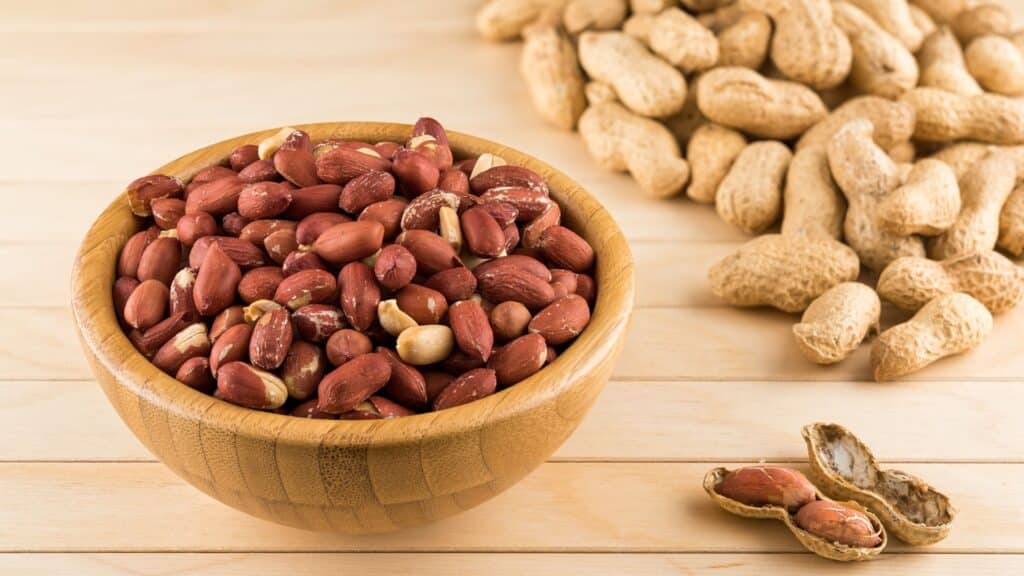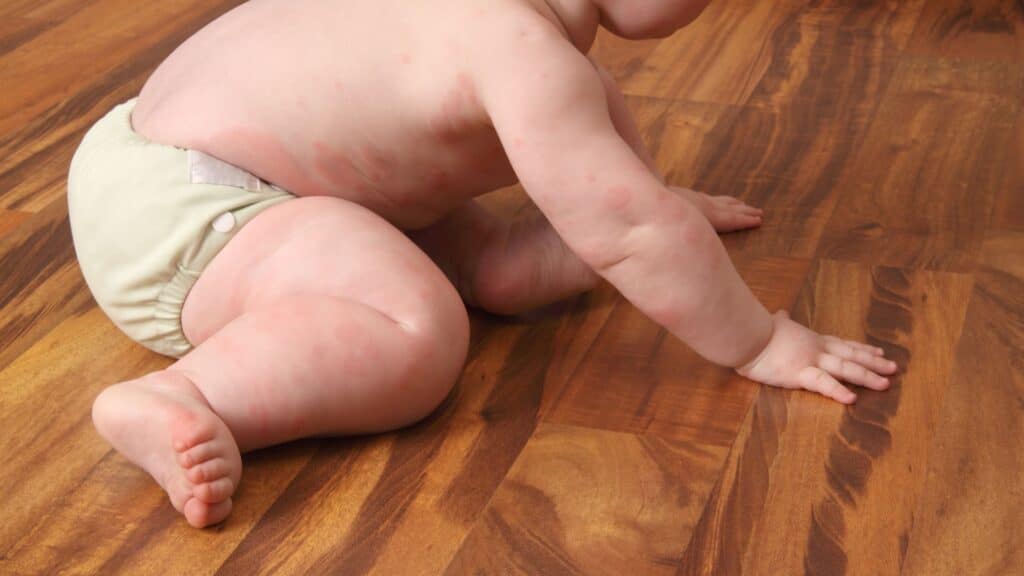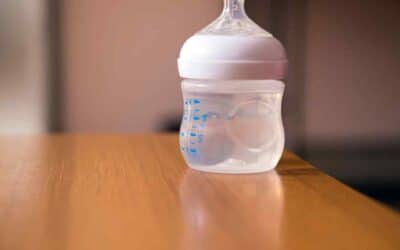Opting for the right baby formula can be a daunting task, especially if your baby is prone to an infant food allergy. Food allergies are prevalent among infants, and they can be triggered by the type of formula used. Being aware of the most common food allergies and the associated allergy symptoms, such as hives, diarrhea, vomiting, and rashes is crucial.
In this blog post, we’ll examine the link between baby formula and food allergy, providing you with everything you need to know about feeding your little one. From understanding common allergens in baby formula to managing and preventing allergies, we’ve got you!

Understanding Baby Formula Allergies
Although most babies are born healthy, their immune systems can react negatively to the food they consume, leading to a food allergy. Unlike food intolerance or sensitivity, a baby formula allergy can trigger a severe immune reaction in your child’s body. If your baby shows allergic symptoms such as a skin rash or runny nose after consuming a formula containing food allergens like peanuts or other allergenic foods, their immune system is making antibodies against those substances. In some severe cases, this can result in life-threatening reactions.
It’s crucial to take swift action if you suspect your child has been exposed to airborne allergens or food allergens in their infant formulas. Breastfeeding has a protective effect and can sometimes help avoid allergic sensitization in infants, but in cases where babies require infant formula, you must seek feeding information on hypoallergenic options. The sooner you act on the symptoms of a baby formula allergy, the better your chance of treating it successfully and preventing allergic rhinitis or other severe allergies.
Consult with an allergy clin immunol pract for appropriate treatment and management.
Common Allergens in Baby Formula
As a new parent, keeping your baby safe from food allergies can be a top priority. Fortunately, taking some precautions can help reduce the risk of your baby developing allergies. The immune system reacts negatively to specific foods, causing symptoms related to food allergies, but you can protect your baby by following guidelines from the allergy foundation. This may include an early introduction to common allergenic foods, as delaying may increase the risk of developing allergies.
Signs of an allergic reaction, such as watery eyes or a life-threatening reaction, can occur within minutes or hours after exposure, and they can affect the respiratory system, skin, or nasal passages. In regards to avoiding allergens, it’s essential to identify and avoid foods that trigger your child’s allergy.

Here are a few common allergens in baby formula:
Milk
It’s used as a base for many formulas and can be hard to avoid if you’re looking at the ingredients list.
Wheat
Wheat is found in many processed foods, so it’s important to check labels if you suspect your baby has a wheat allergy.
Soy
Soy is a common allergen that can cause skin rashes, digestive problems, and respiratory issues in babies. Soy formula is not recommended for infants with a history of allergies or colic.
Oats
Oats are a great source of fiber and vitamins A, C, E, and K, but the risks of an allergic reaction can outweigh these benefits for babies with an allergy to oats.
Rice
Rice allergies are typically caused by a protein called saponin, which is found in the bran of rice.
Peanuts
If you have a family history of peanut allergies, avoiding peanuts during pregnancy, breastfeeding, and baby formula feeding is best.

Different Types of Baby Formula
There are many different types of baby formula, and it can be hard to know which one is right for your child. Here’s a rundown of some of the most popular ones:
Milk-Based Formula:
This formula is made from cow’s milk and has all the nutrients your baby needs to grow properly. It’s also easy on your budget but can be difficult to digest for some babies.
Soy-Based Formula:
Soy-based formulas are made from soybeans and have many nutrients as milk-based formulas, but some babies may not digest them as easily.
Almond-Based Formula:
Almond-based formulas contain no animal products and are usually fortified with vitamins and minerals, but they can be expensive and may not be nutritionally complete for infants under one year old.
Cow’s Milk-Based Formula:
This is the most common type of formula, and it’s made with cow’s milk. It comes in powder and liquid forms. The powder version is more concentrated than the liquid form, so you’ll have to mix more powder with water to get the same amount of nutrients as you would from the liquid version.
Common Allergies to Baby Formula
Many kinds of allergies can occur in babies, and some can be a problem when you’re trying to feed your little one.
Here’s a look at some of the most common ones you might run into when feeding your baby with formula.

Cow’s Milk Protein Allergy
One of the most common allergies for babies is a cow’s milk protein allergy. This means that your baby’s immune system has developed an allergic reaction to the protein found in cow’s milk, which is one of the ingredients used in many types of formula.
Soy Allergy
Another common allergy for babies is a soy allergy. Soy is another ingredient that can be found in some types of formula and breast milk substitutes like soy-based formulas or even soy-based foods such as soy milk or other soy-containing products like meat substitutes made from soybeans (such as tofu).
Symptoms and Signs of Allergies in Infants
The symptoms and signs of allergies in infants by baby formula vary depending on the age and severity of the allergy.
As a general rule, if your infant is between 4 and 12 months old, you can expect to see symptoms of mild to moderate allergic reactions within a few minutes after feeding. Symptoms may include:
- Hives (Tiny Red Bumps)
- Rash or Eczema (Red, Scaly Skin)
- Trouble Breathing
If your infant is between 12 and 24 months old, you can expect to see more serious allergic reactions that may require immediate medical attention. These reactions may include:
- Difficulty Breathing or Wheezing
- Vomiting or Nausea
- Diarrhea

If you suspect your infant might be experiencing an allergic reaction, it’s important to seek advice from your doctor regarding testing options. Skin prick tests and blood tests are the most common methods for testing food allergies. These tests can determine whether the immune system makes antibodies against the suspected allergens, including those from dust mites, insect stings, or foods that are ingested through breast feeding or other means. In some cases, an oral food challenge may be recommended to further confirm or rule out a suspected food allergy.
Seeking guidance from an allergist or consulting journals such as J Allergy Clin Immunol can help ensure proper testing and management of potential food allergies in your infant.
Managing Allergies in Infants
Allergies are a common problem for infants. They can be difficult to identify, as they may be mistaken for other conditions such as colic or reflux. However, there are several ways to identify allergies in infants.
How to Identify Allergies in Infants?
The first step is to journal your baby’s symptoms and the foods you give them. This will help you to see if there is any correlation between eating certain foods and having an allergic reaction.
You should also note what time of day your baby has an allergic reaction. For example, if they have an allergic reaction after eating eggs every morning, it might be due to egg sensitivity rather than something else.
Strategies for Managing Baby Formula Allergies
One strategy is switching to a different type of formula: if your child has an allergy to cow’s milk protein, you might try soy-based or goat’s milk formulas.
If they’re allergic to whey protein, you could try an amino acid-based formula or one made from rice or pea protein. Another option is to try hydrolyzed formulas. These contain smaller proteins that are easier for babies’ bodies to digest and, therefore less likely to trigger an immune response.
Also, if your baby is allergic to milk protein or other common allergens, you may be able to manage their allergies by using hypoallergenic formula. However, if your child continues to have problems, it is important to consult with a healthcare professional for allergy management.

Preventing Allergies in Infants
The best way to prevent allergies in infants is to do everything you can to prevent them from developing in the first place.
Breastfeeding offers a number of advantages for the health of both mother and child, and one of those is that it can help reduce your child’s risk of developing allergies. For example, breastfeeding reduces their risk of developing food allergies. Babies who are breastfed are also less likely to develop eczema, asthma, and other conditions that allergies can cause.
After introducing solids, avoid giving your child foods that might trigger an allergic reaction, such as cow’s milk products or eggs until they turn 1 year old. It’s also important to keep track of what your baby eats so you can identify any potential allergens before they cause any problems.
How to Introduce New Foods to Infants to Help Prevent Allergies from Developing?
Here are some tips on how to introduce new foods to infants to help prevent allergies from developing:
1. Start early. Introduce your baby to solids between 4 and 6 months of age, when their digestive system is mature enough to handle it.
2. Avoid common allergens. If you have a family history of food allergies, avoid introducing those foods until after your baby’s first birthday.
3. Don’t force it! If your baby isn’t interested in trying new food, don’t force them to eat it. Just try another time again!
Choosing the Right Formula: A Parent’s Ultimate Guide
Making an informed decision when selecting the appropriate baby formula for allergy-prone infants involves carefully assessing important factors such as your baby’s unique digestive capacity, specific nutritional requirements, and any familial history of allergies. Combined together, all of these aspects serve as critical determinants in the type of baby formula you eventually choose for your child.
Hydrolyzed formulas, for example, represent an excellent and safe choice for babies with a heightened potential risk of allergies. In these specialized formulas, proteins are meticulously broken down into smaller, absorbable particles, significantly reducing the overall chance of triggering an allergic reaction. Alternatively, some infants might immensely benefit from a specialized formula specifically designed to cater to unique medical conditions or lactose intolerance. Such carefully formulated products ensure that they receive essential, life-sustaining nutrients without the risk of triggering any adverse allergic responses.
Don’t hesitate to seek and trust professional advice. Expert pediatricians and dieticians are well-equipped with the requisite expertise to accurately recognize subtle signs of potential allergies and guide you in choosing an ideal, nutritionally balanced formula particularly suitable for your little one’s individual needs and susceptibilities. Armed with the right knowledge and sound, expert guidance, ensuring your baby’s safety against food allergies becomes a less daunting and a manageable task, paving a well-lit path for their harmoniously happy and healthy growth.
Remember, choosing the right formula is an act of incredible care — it requires thoughtful, well-informed consideration and can significantly impact your baby’s well-being. Make that choice count! Be confident in your decisions.

Takeaway
In conclusion, choosing the right baby formula can be daunting, especially if your little one is prone to allergies. Allergies in infants aren’t uncommon, and they can be caused by various factors, including the type of formula you use. It’s important to understand the common allergens found in baby formula: milk, wheat, soy, oats, and rice, as well as peanut oil.
If you suspect your baby has developed an allergy caused by something in their formula, it’s crucial to take action immediately. The symptoms of a baby formula allergy can range from mild to life-threatening, so the sooner you act on them, the better your chance of treating it successfully.
Remember, if you have concerns about your baby’s health or feeding, it’s always best to consult your healthcare provider. They can provide expert advice and guidance to ensure your little one stays happy and healthy.
If you have any questions or concerns, please feel free to leave a comment below.



